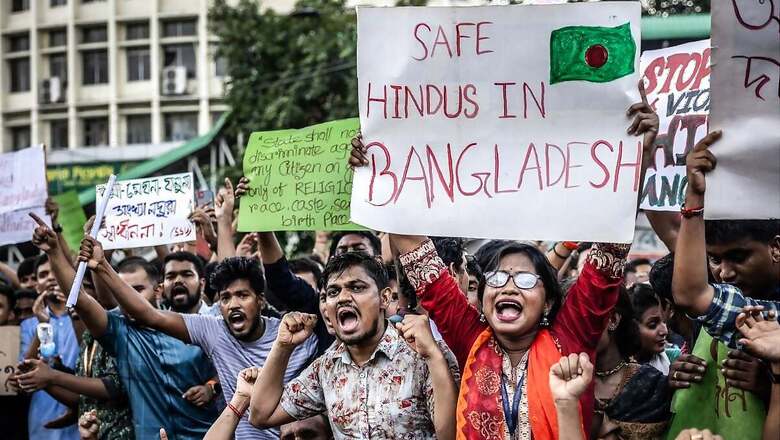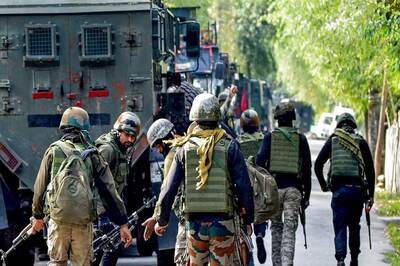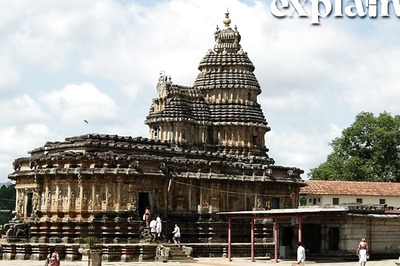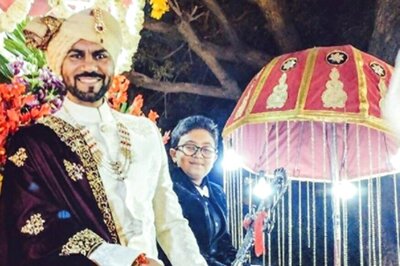
views
After the resignation and subsequent fleeing of Sheikh Hasina from Bangladesh on 5 August, there has been a spate of attacks on Hindus across many districts of the country. Leading Bangladeshi dailies, both English and Bengali, have been reporting on how Hindu houses and temples are being targeted. According to a 6 August report by the Daily Star, a leading English daily in Bangladesh, Hindu houses, temples, and businesses were attacked in 27 districts. Another report from the same daily on 7 August detailed how the targeting of Hindu homes, temples, and businesses continued, noting that even the house of well-known musician Rahul Ananda, which was 140 years old, was not spared and was burnt.
A section of intellectuals in the neighbouring country has also expressed disappointment over the ongoing attacks on Hindus. The caretaker Prime Minister of the interim government, Muhammad Yunus, has clearly voiced his opposition to the attacks on the Hindu minority. In an effort to make their suppressed voices heard, minority Hindus recently organised a large protest rally in the capital city of Dhaka.
Hindus being attacked because of their faith
At a time when Hindus and their temples are being targeted in Bangladesh, Indian liberals seem to be ignoring the issue. One prime-time anchor, who frequently self-identifies as a “liberal,” expressed dissatisfaction with the Hindu-Muslim divide in the context of the Bangladesh situation. He noted that both Muslims and Hindus have been targeted since Sheikh Hasina’s exit. While he was correct in acknowledging that Muslims have also been victims, he failed to mention — or perhaps chose not to highlight, as it doesn’t align with his narrative — that the targeted Muslims are not being attacked because of their faith. The Muslims being targeted are either supporters or leaders of Sheikh Hasina’s Awami League.
However, the situation for Hindus is different. While it is true that Hindus have traditionally supported Hasina’s Awami League, it is also true that many Hindu students participated in the anti-quota movement against the Hasina government. Even if a significant number of Hindus are traditional supporters of the Awami League, the reality is that they, unlike the targeted Muslims, are not being attacked for their political loyalty.
If this were purely a political issue, then why are no mosques being attacked, while Hindu temples across the country are being targeted? According to an August 7 report in the Daily Star, the Radha-Krishna idols at the Dhanuka Manasa Bari temple in Shariatpur were destroyed, and the temple was razed to the ground. This is just one example of the many Hindu temples attacked by angry mobs, or more specifically, by Islamists.
Rise of Islamic penetration in Bangladeshi society
Over the last decades, Islamic radicalism has increased in Bangladesh, even when Sheikh Hasina, who pursued a moderate tolerance policy towards the minority Hindus, was in power. This is because, unfortunately, Hasina also empowered the Islamic organisation Hefajat-e-Islam to strengthen her political hold on the country’s society. The 2016 Holey Artisan Bakery terrorist attack—in which six Islamic terrorists, all in their late teens or early twenties, products of the country’s elite, having attended several of the country’s top English-medium private schools as well as universities both in the country and abroad, went on to mercilessly kill 22 people based on radical Islamic ideology—showed how deeply the radicalism has penetrated Bangladeshi society.
This became even clearer in 2021 during Durga Puja, when Hindus were falsely accused of disrespecting the Muslim holy book, and widespread attacks by Islamists against Hindus followed. Let’s not forget that Sheikh Hasina was also in power at that time.
Indian Liberals’ Hatred Against Hindus Comes to the Fore Again
It can be seen that irrespective of whether Hasina is in power or out of power, Hindus of Bangladesh have faced the brunt of Islamists in the country—and this hatred has increased in the last decade as a result of the rise of radical Islamism in Bangladeshi society. It is not that Indian liberals are unaware of the ground realities of Bangladesh. They definitely know.
But their ideology of Hindu hatred makes it difficult for them to accept the reality. They are more concerned about Hindu polarisation in India rather than the fact that minority Hindus in neighbouring Bangladesh are attacked mainly for practising Hinduism. This also once again shows the harsh reality that they are not followers of liberalism in reality.
This is not the first time we’ve witnessed such a selective approach. In 2017, when around 99 minority Rohingya Hindus in Rakhine, Myanmar, were brutally killed by Islamist Rohingya terrorists, the Indian liberals — who were tirelessly raising their voices for the Rohingya Muslims — remained largely silent on the plight of the Hindu minorities in Myanmar. While these liberal intellectuals wrote numerous op-eds advocating for the free entry of Rohingya Muslims into India, despite being fully aware of the dangers posed by strong radicalism among them, they were mostly silent on the genocide of Hindus. According to the Myanmar Army, this genocide was a contributing factor to the mass exodus of Rohingya Muslims from Myanmar. This writer, however, did address the issue in Assam’s leading English daily, titled ‘Why No Tears for Rakhine Hindus of Myanmar?’
Strong Mechanism Needed To Address Hindu Hate
Let’s accept the bitter reality that Indian liberals don’t seem to be much concerned about the plight of Hindus, whether they are attacked in Bangladesh, Kashmir, Myanmar, or anywhere else. For them, scoring political points to keep their superficial liberal ideology relevant appears to be more important than the lives of ordinary Hindus. Trying to correct them is a completely futile exercise, as they are deeply polarised. The primary concern should be the security of Hindus worldwide.
It’s a fact that hatred towards Hindus — mainly for their belief in the Supreme God manifesting in multiple forms and their practice of worshipping these forms through murtis — has been normalised by intolerant fascist ideologies across the globe. To address this, a strong and viable platform must be established. We need to build a robust ecosystem, which includes proper education about Hinduism and its culture from the school to the college level. The education curriculum, where many inaccuracies about Hinduism and its culture are still taught, needs to be rectified to make it more Indic. Simply shortening the syllabus is not the solution, as many stories, particularly those related to Indic culture, have already been omitted from our education system. This model should also be extended beyond India’s borders, particularly to universities abroad.
This would be possible only if the Government of India takes the initiative by implementing radical changes in the current education system to make it more pro-Indic, and by funding universities abroad to promote Indic civilisation. Not only do the largest number of Hindus in the world live in India, but the history and culture of this land, an ancient living civilisation, are also deeply intertwined with Hinduism — making India the appropriate voice to address the issue of Hindu hatred worldwide. However, for this to materialise, Hindus in India must unite, setting aside their political, caste, and regional differences, and collectively pressurise the Government of India — regardless of the party in power — to build a strong ecosystem that can effectively tackle hate crimes against Hindus globally.
Sagarneel Sinha is a political commentator and tweets @SagarneelSinha. Views expressed in the above piece are personal and solely those of the author. They do not necessarily reflect News18’s views.


















Comments
0 comment